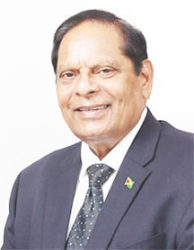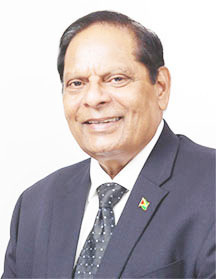In a last ditch effort to have their voices heard, a group of Media Owners and Operators yesterday delivered a letter to the office of Prime Minister Moses Nagamootoo, seeking an audience with him to discuss their concerns ahead of today’s planned debate of the Broadcast (Amendment) Bill 2017.
However, Nagamootoo will only see the correspondence today as he spent all of yesterday in a cabinet meeting.

Director of Public Information Imran Khan when contacted by Stabroek News confirmed that the office did receive the letter which was signed by the proprietors of eight privately-owned radio and television stations. “It could not be brought to his attention because he is in a cabinet meeting all day”, Khan said while noting that the letter will be brought to the Minister’s attention this morning, following which he (Khan) would be in a better position to give an informed comment on whether the minister will meet with the group and whether the debating and passage of the bill will be deferred.
Stabroek News was unable to reach Nagamootoo directly.
The Media Owners and Operators who signed the letter represent Freedom Radio, CNS TV 6, Channel 72, NTN TV/Radio, TVG 28/89.5 FM, MBC Channel 93, Little Rock Television (LRTV) and MTV
Several of the Media Owners and Operators when contacted told this newspaper yesterday that they have heard nothing and fear that the Bill will be passed without their concerns being placed on record. One broadcaster said that they had little time to pen the letter and deliver same to the minister. The Bill was read for the first time in the National Assembly last Thursday.
In the letter, the group of media proprietors, operators and representative sought an audience with Nagamootoo to engage him on their concerns with the Bill.
“We believe that the proposed Bill in its current form have serious implications for the sustainability of our operations and, to some extent, infringes on our freedom to determine broadcast content”, the letter said.
The group said that it is their understanding that the Bill could be passed in the National Assembly before the end of the week, leaving them “little time for the engagement proposed for the consideration of our concerns and inputs”.
It is for this reason, the letter said, that they urge that the Bill’s passage be deferred in the absence of the proposed meeting. “We believe that meaningful consultation on this piece of legislation is imperative having not been afforded the opportunity during its preparations. Having looked at the proposed bill, we can see a number of issues to be raised in terms of constitutional matters. Both the meeting, and deferral as requested would give us the opportunity to raise these matters”, the letter added.
Yesterday, the proprietors this newspaper spoke with again reiterated the unfairness of crafting a bill without any consultation or an attempt to get their input. One agreed with the carrying of important public service messages but said that the line has got to be drawn at some point because it would be unreasonable to ask privately owned stations to carry things that cannot be described as urgent or important.
Dire
Another proprietor expressed worry that the passage of this bill can have dire implications for the private media in Guyana and questioned the rationale behind the crafting of this bill without the main subject – broadcasters.
Meanwhile, an opposition MP yesterday explained that it is the Prime Minister who will have to make the final call as it relates to whether the Bill will be proceeded with at today’s sitting or not.
The proposed amendments to the existing broadcast legislation will require in part all radio and television broadcasters to apply for licences within 30 days of the changes coming into force or face immediate closure of their operations. The bill also says that broadcasters who fail to apply for licensing or are rejected by the broadcast authority shall immediately halt operations or they would be guilty of an offence, for which they could face a one-year prison term, a fine of $1 million and the forfeiture of all their equipment.
If the bill is enacted in its present form, every broadcaster would have to air public service programmes for a total of up to 60 minutes per day, between 6am and 10 pm, free of cost.
It is expected that the bill could go some way towards fulfilling Nagamootoo’s previous promise to re-examine and possibly revoke licences controversially granted under the Jagdeo-led PPP/C administration in 2011, prior to the broadcast law coming into force. How to handle these licensees had created turmoil at the Guyana National Broadcasting Authority (GNBA) after the APNU+AFC government took office in 2015.
Following a meeting with a team from the opposition People’s Progressive Party/Civic (PPP/C) on Monday the Media Owners and Operators issued a press statement in which they addressed concerns over the bill, including whether it would violate constitutional rights.
“The primary concerns were the negative impact it could have on sustainability of operations with regard to the licensing fee structure, the imposition on property and the infringement on the freedom to determine the broadcast content,” the operators said in the statement.
They also noted that they had not been consulted on the content of the bill and believe that its impact on freedom, livelihood and jobs compels “the decency of having consultations,” with the allowance for inputs.
According to the statement and owners with whom Stabroek News spoke on Monday there are two areas of major contention. The first of these is the mandatory requirement that all stations air “public service programmes” for up to 60 minutes a day, free of cost, between 6 am and 10 pm.
According to the bill, the mandatory broadcast of public service programmes will include addresses to the nation by the President and emergency notices or disaster warnings issued by the Civil Defence Com-mission, the police, fire service, the health ministry or any other authorised agency.
Though the bill defines such broadcasts as “programmes produced for the purpose of informing and educating the public, and promoting policies and activities of the Government that benefit the public as a whole,” Persaud contends that it is simply not a clear enough definition.
Aside from the Media Owners and Operators, Opposition Leader Bharrat Jagdeo had also expressed concern about the proposed amendments and warned that the bill if passed is a threat to press freedom.
“If we allow this bill to succeed, it would be the beginning of the end of press freedom in Guyana and so I would urge people in this country to read the bill,” he had said during a press conference last Friday while arguing that the provision could force broadcasters to air government propaganda free of cost.
He also voiced concern about the requirement that broadcasters reapply for licensing. “It is a direct threat to what we have now, the people who are broadcasting at this point in time,” he said, while adding that he has no doubt that the government would use “political criteria to make that determination.”
Guyana National Broadcasting Authority (GNBA) Chairman Leslie Sobers last Friday refuted the contention that the changes could be used to force broadcasters to air propaganda.
“It is not going to be propaganda. It is public service announcements (PSAs)—that is very distinct from propaganda. And, of course, if persons believe that what they are asked to publicise is not in keeping with the concept of a PSA, then they can appeal to the broadcast authority, then we can look at it. And if we agree with them, then we will call upon the agency to pay and if we disagree with the broadcaster, then we will dismiss the appeal and direct them to continue to carry it, but certainly we know the difference between a PSA and a propaganda,” he had explained.
Asked about the wording in the bill, which defines “public service programmes” as those “produced for the purpose of informing and educating the public, and promoting policies and activities of the Government that benefit the public as a whole,” Sobers noted that government policies are designed to benefit the people. “For example, the government policy is to ensure that Guyanese enjoy good health. Then you have an upsurge, I think, in Filaria and there was the introduction of DEC salt. A lot of people had a lot of suspicions on it. So a PSA would be there to educate people on the benefits of using that and that is in keeping of the government policy in ensuring that we have a healthy lifestyle. I don’t think the GNBA would sanction as a PSA anything that is politically-oriented, so campaign strategies and so on could never be regarded as a PSA,” he had explained.






